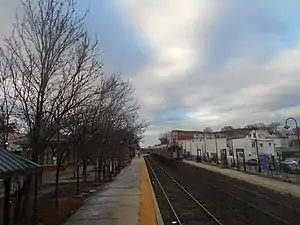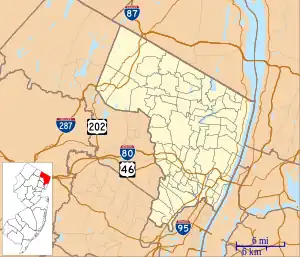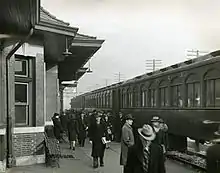Rutherford | |||||||||||||||||||||
|---|---|---|---|---|---|---|---|---|---|---|---|---|---|---|---|---|---|---|---|---|---|
 Rutherford station from the Hoboken Terminal-bound mini high-level platform in January 2015. | |||||||||||||||||||||
| General information | |||||||||||||||||||||
| Location | Park Avenue, Orient Way, Union Avenue, and Erie Avenue Rutherford, New Jersey | ||||||||||||||||||||
| Owned by | New Jersey Transit | ||||||||||||||||||||
| Platforms | 2 side platforms | ||||||||||||||||||||
| Tracks | 2 | ||||||||||||||||||||
| Connections | NJT Bus: 76 and 190 | ||||||||||||||||||||
| Construction | |||||||||||||||||||||
| Parking | 136 spaces | ||||||||||||||||||||
| Bicycle facilities | Yes; bicycle racks | ||||||||||||||||||||
| Accessible | Yes | ||||||||||||||||||||
| Other information | |||||||||||||||||||||
| Station code | 2105 (Erie Railroad)[1] | ||||||||||||||||||||
| Fare zone | 3[2] | ||||||||||||||||||||
| History | |||||||||||||||||||||
| Opened | December 4, 1833[3] | ||||||||||||||||||||
| Rebuilt | c. 1862, 1897[4] | ||||||||||||||||||||
| Passengers | |||||||||||||||||||||
| 2018 | 1,369 (average weekday)[5] | ||||||||||||||||||||
| Services | |||||||||||||||||||||
| |||||||||||||||||||||
| |||||||||||||||||||||
Rutherford Station | |||||||||||||||||||||
 Rutherford Station building taken from Station Square in Rutherford. | |||||||||||||||||||||
 | |||||||||||||||||||||
| Location | Station Square Rutherford, New Jersey, USA | ||||||||||||||||||||
| Coordinates | 40°49′42″N 74°6′6″W / 40.82833°N 74.10167°W | ||||||||||||||||||||
| Area | 0.5 acres (0.2 ha) | ||||||||||||||||||||
| Built | 1898 | ||||||||||||||||||||
| Architect | Charles W. Buchholz | ||||||||||||||||||||
| Architectural style | Renaissance, Queen Anne | ||||||||||||||||||||
| MPS | Operating Passenger Railroad Stations TR | ||||||||||||||||||||
| NRHP reference No. | 84002584[6] | ||||||||||||||||||||
| NJRHP No. | 667[7] | ||||||||||||||||||||
| Significant dates | |||||||||||||||||||||
| Added to NRHP | June 22, 1984 | ||||||||||||||||||||
| Designated NJRHP | March 17, 1984 | ||||||||||||||||||||
Rutherford is a New Jersey Transit railroad station served by the Bergen County Line located in Rutherford, New Jersey, United States. The station is located near a traffic circle at the junction of Park Avenue, Union Avenue, Erie Avenue and Orient Way known as Station Square, with a grade crossing on Park Avenue.
History

The Paterson and Hudson River Railroad was constructed through Union Township in 1833 (still mostly farmland at this point), and a station was constructed adjacent to the "Boiling Springs" (actually cold, but so named due to its turbulent flow). The service on the railroad line was initially passenger coaches pulled by horses, with the driver having a seat in the coach. The railroad soon switched to locomotive-hauled, purchasing two locomotives built in Baltimore, Maryland. The introduction of the locomotive service helped spur building construction and development in the area around Boiling Springs. The increased demand led the railroad to build a new station and ticket office as they bought land in the area to speculate on future development. The Erie Railroad which acquired the P&HR constructed a depot that was triangular in design made out of brick. The station depot was replaced in 1862. This structure in turn was replaced by the current construction of 1897.[4] Around this time, the boroughs of Rutherford and East Rutherford were carved out from Union Township, choosing the railroad tracks as the mutual border.
The station building has been listed in the New Jersey Register of Historic Places and National Register of Historic Places since 1984 and is part of the Operating Passenger Railroad Stations Thematic Resource.[8][7][6]
Restoration
A two phase restoration project was started by New Jersey Transit in May 2008. The first phase to restore the outside of the building cost $1.4 million and was completed in June 2009.[9] The second phase of the project was to restore the interior and cost $1.9 million. The second phase was completed on October 25, 2010.[10]
Station layout
The station has two tracks, each with a low-level side platform.
| Ground/ Platform level |
Side platform, doors will open on the right | |
| Track 1 | ← Bergen County Line toward Waldwick or Suffern (Wesmont) ← Port Jervis Line does not stop here | |
| Track 2 | Port Jervis Line does not stop here → Bergen County Line toward Hoboken (Secaucus Junction) → | |
| Side platform, doors will open on the right | ||
| Street level | Station building, ticket machines, parking | |
See also
Bibliography
- Lucas, Walter Arndt (1944). From the Hills to the Hudson: A History of the Paterson and Hudson River Rail Road and its Associates, the Paterson and Ramapo, and the Union Railroads. New York, New York: The Cornwall Press. hdl:2027/uc1.b4536228. Retrieved April 10, 2021.
- Van Valen, James M. (1900). History of Bergen County, New Jersey. New York, New York: New Jersey Publishing and Engraving Company. Retrieved August 18, 2017.
References
- ↑ "List of Station Names and Numbers". Jersey City, New Jersey: Erie Railroad. May 1, 1916. Retrieved November 23, 2010.
- ↑ "Main and Bergen County Line Timetables" (PDF). Newark, New Jersey: New Jersey Transit Rail Operations. November 7, 2010. Archived from the original (PDF) on January 24, 2002. Retrieved November 27, 2010.
- ↑ Lucas 1944, p. 122.
- 1 2 Van Valen 1900, p. 429.
- ↑ Kiefer, Eric (February 21, 2018). "Here Are New Jersey Transit's Most, Least-Used Train Stations". patch.com. Retrieved September 13, 2022.
- 1 2 "National Register Information System". National Register of Historic Places. National Park Service. March 13, 2009.
- 1 2 "New Jersey and National Registers of Historic Places". New Jersey Department of Environmental Protection - Historic Preservation Office. Retrieved January 7, 2015.
- ↑ Rutherford New Jersey Transit Railroad Station Survey
- ↑ The Record May 15, 2008.
- ↑ "Train station work all done". Leader Newspapers. Retrieved November 11, 2010.
External links
 Media related to Rutherford (NJT station) at Wikimedia Commons
Media related to Rutherford (NJT station) at Wikimedia Commons